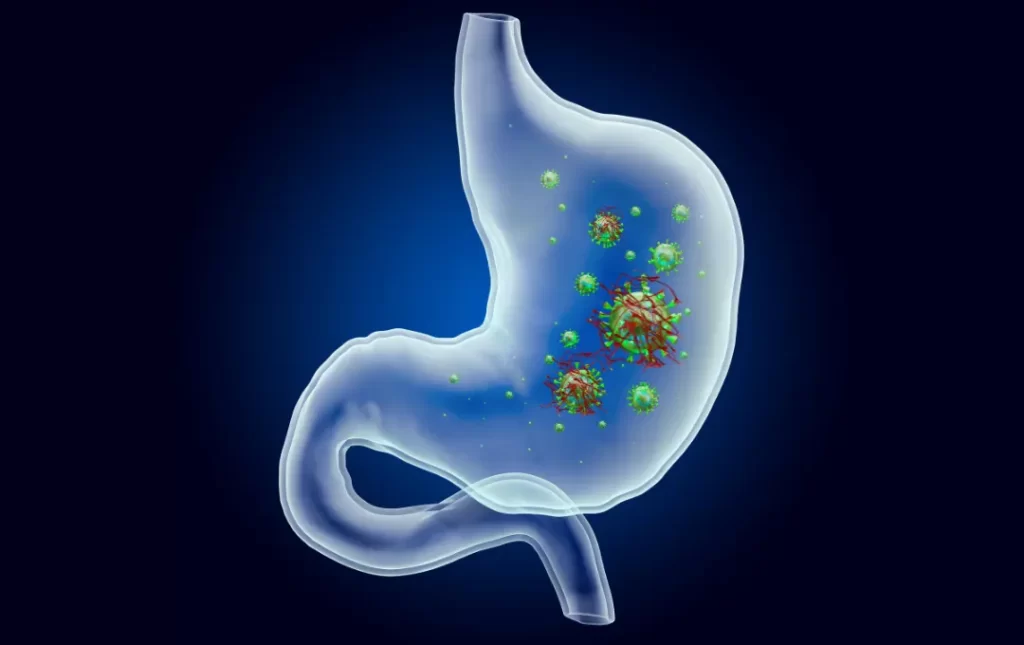Is saffron good for gastritis? Saffron, known as “red gold,” is the most expensive plant worldwide. Saffron has numerous benefits for the health of the human digestive system. In this article, we aim to familiarize you with the properties of saffron for the gastritis.

Amazing Properties of Saffron for the Digestive System
Saffron has numerous benefits for human health, and in the following, we specifically focus on introducing its most important properties for the health of the digestive system.
Saffron and Gastric Cooling
As we mentioned before in the article on the temperament of saffron, according to traditional medicine, saffron has a warm and dry temperament. Therefore, it is introduced as a seasoning for cold foods such as rice. Hence, this valuable plant reduces gastric cooling.
Cool temperament in any of the body’s internal organs can lead to various diseases and different types of pain. The use of warm-tempered foods is an important recommendation of traditional medicine physicians.
Saffron and gastritis
Sometimes, due to various factors, including the Helicobacter pylori bacteria, a part of the protective mucus covering the stomach’s inner lining is eroded. In this condition, stomach acid causes damage to the stomach wall, commonly known as gastric ulcers.
Now the question arises: Is saffron good for treating these ulcers?
Saffron contains a pigment called crocin. This substance has highly antioxidant properties. According to research, the antioxidant in saffron prevents gastric ulcer progression. Consequently, based on the conducted studies, it has been determined that the effect of saffron in treating gastric ulcers is greater than that of chemical drugs. Moreover, saffron reduces gastric inflammation.

Saffron and Constipation Treatment
Another property of saffron for the stomach is its assistance in relieving constipation. Constipation is one of those diseases that, if left untreated, can cause problems in other parts of the body. Constipation leads to the retention of toxins in the body.
Saffron is a plant that the great Avicenna recommends to relieve digestive problems and constipation. Saffron can be consumed as tea, syrup, or powder in various foods to help alleviate constipation.
Other Benefits of Saffron for the Stomach
Saffron has numerous benefits for the stomach. So far, we have discussed some of its most important properties. However, it is interesting that with its high antioxidant content, saffron prevents the development of digestive system cancers such as stomach and intestinal cancer.
One common digestive problem is gastric reflux. In individuals with gastric reflux, stomach acid enters the esophagus and causes severe burning sensations. Saffron can prevent the reflux of stomach acid and alleviate its unpleasant symptoms.
Saffron is also suitable for individuals who frequently experience bloating and stomach pains, as it helps reduce stomach inflammation.
Saffron is rich in minerals, vitamins, carbohydrates, and carotenoids such as crocin, each of which plays a specific role in overall health and the health of the digestive system. Saffron is known as a stomach tonic. Therefore, it is recommended to include saffron tea or powder in your diet, particularly in rice dishes, to benefit from its exceptional properties.
In summary,
saffron is the world’s most popular medicinal plant due to its various medicinal and therapeutic properties, which are utilized in both modern and traditional medicine.
One important application of saffron is its benefits for the stomach, which we have discussed in this article. It should also be mentioned that saffron is known for its stress-relieving properties and stimulating effects, which can benefit the stomach.
F&Q
Can saffron cause stomach issues?
Yes, saffron can cause stomach issues in some people.
Saffron is generally considered safe when used in moderation. However, some people may experience stomach problems such as nausea, vomiting, and diarrhea after taking saffron. These problems are more likely to occur when saffron is taken in high doses or for long periods.
Who should avoid saffron?
Pregnant or breastfeeding women. Saffron can cause uterine contractions, which could lead to miscarriage or premature birth.
Children. Saffron is not recommended for children under the age of 12.
People with allergies. Saffron can cause allergic reactions in some people.
People with certain medical conditions. Saffron can interact with certain medications, so it is important to talk to your doctor if you have any medical conditions before taking it.
Does saffron reduce inflammation?
Yes, saffron has been shown to reduce inflammation in the body.
Saffron contains compounds called crocin and crocetin, which have anti-inflammatory properties. These compounds can help to reduce the production of inflammatory molecules, such as cytokines and chemokine.


